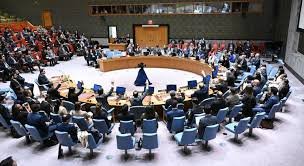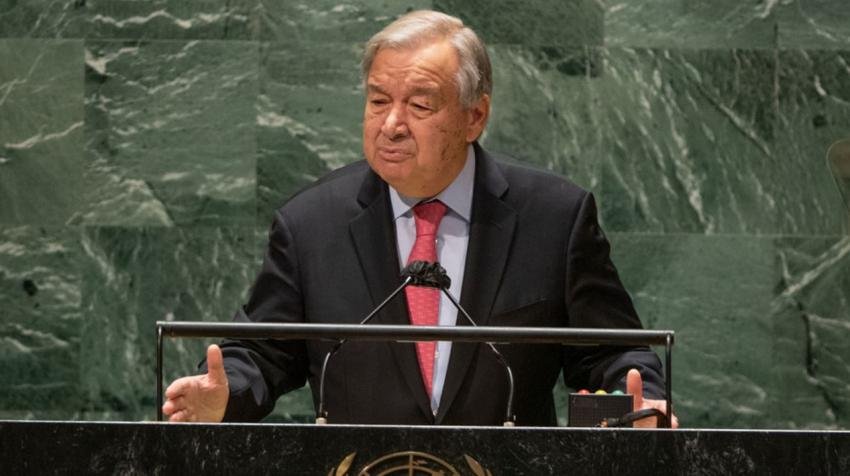Overview of the General Assembly Meeting
The recent UN General Assembly meeting served as a significant platform for discussing the US veto of a resolution that called for an immediate ceasefire in Gaza. This gathering was convened in response to the growing international concern regarding the escalating violence and humanitarian crisis in the region. The veto initiative sparked a vital debate among member states, reflecting the diverse opinions and perspectives that characterize the global response to the Gaza conflict.
The primary purpose of this debate was to address the implications of the US veto on international efforts to broker peace and foster stability in Gaza. The resolution in question aimed to call for a halt to hostilities, which many nations argued was crucial to preventing further loss of life and alleviating the suffering endured by civilians caught in the conflict. Participants in the meeting underscored the importance of collective action and emphasized the role of the United Nations in mediating disputes and promoting peaceful resolutions.
This assembly was not just a routine gathering; it represented a critical moment for member states to articulate their positions and advocate for their respective diplomatic approaches. The discussions highlighted contrasting views, with some nations supporting the US’s position while others vocally criticized it. Many member states expressed their disappointment with the veto, contending that it hindered the prospects for peace and failed to acknowledge the urgency of the humanitarian situation in Gaza. The variety of perspectives presented during the meeting epitomized the complex nature of international relations surrounding this protracted conflict.
Ultimately, the meeting reflected the UN General Assembly’s ongoing commitment to addressing global concerns, fostering dialogue, and supporting initiatives aimed at finding viable solutions to the Gaza conflict. The outcomes of this debate could significantly influence future diplomatic efforts and shape the international community’s approach to peace in the region.
Key Arguments and Justifications for the US Veto
The United States has long maintained a pivotal role in the discussions surrounding the Gaza conflict, particularly through its position in the United Nations General Assembly. When the US exercised its veto power regarding a resolution related to the conflict, several key arguments underscored this decision. Primarily, American officials emphasized the necessity to explicitly condemn Hamas for its aggression and actions deemed hostile towards Israel. The US rationale revolved around the belief that failure to acknowledge Hamas’s role could undermine efforts toward achieving lasting peace in the region.
An additional justification for the veto was rooted in the assertion of Israel’s right to self-defense. The US administration contended that any resolution passed without a clear affirmation of this principle would not only be inequitable but could also exacerbate tensions in an already volatile environment. By insisting that Israel’s security concerns be front and center, the US aimed to reinforce its longstanding alliance with Israel while simultaneously seeking to stabilize the region.
Moreover, the US veto aligned with its endorsement of former President Trump’s peace plan, which was introduced as a comprehensive approach to resolving the Israeli-Palestinian conflict. This blueprint focused on several critical components designed to foster a sustainable peace process. Notably, the plan called for immediate ceasefire provisions, which would theoretically halt ongoing hostilities. Furthermore, it included stipulations for negotiations concerning hostages, which have been a significant humanitarian concern during the conflict. In addition, the economic redevelopment efforts proposed by the plan aimed to address underlying grievances that contribute to the cyclical nature of violence in Gaza. Overall, the US rationale for vetoing the resolution centered around advocating for a balanced view of the conflict while promoting a structured peace initiative.
Reactions from Israel, Palestinian Leaders, and Arab States
The recent UN General Assembly debate regarding the Gaza conflict has elicited a range of reactions from various stakeholders, most notably Israel, Palestinian leaders, and representatives from Arab states. Israel has conveyed strong support for the United States’ veto, viewing it as a necessary action that underscores its perspective on national security and sovereignty. Israeli officials interpret the proposed peace plan as a ‘clear path forward’ for resolving ongoing hostilities, emphasizing the importance of direct negotiations that include security guarantees for Israel. This stance is rooted in a belief that any sustainable resolution must prioritize Israel’s right to defend itself against aggressions emanating from Gaza.
In stark contrast, Palestinian leaders and representatives from Arab nations expressed profound disappointment over the US veto. They perceive this action as a further obstacle to peace, arguing that it disregards the urgent need for humanitarian aid and the recognition of Palestinian statehood. Palestinian authorities stress that any viable peace plan must be built upon the principles of equity and justice, rather than merely reflecting the interests of Israel. They call for the international community to step in and advocate for a balanced approach that addresses the humanitarian crisis in Gaza while working toward a diplomatic resolution.
Arab states have echoed these sentiments, highlighting the necessity for an immediate and concerted effort to alleviate suffering in the region. Their pleas for increased humanitarian assistance are often accompanied by calls for solidarity with the Palestinian cause, emphasizing the need for a unified Arab response to the ongoing humanitarian challenges. This juxtaposition between Israel’s insistence on security and the urgent calls for humanitarian support from Palestinian and Arab leaders illustrates the complexity of the discourse surrounding the Gaza conflict, marking a clear divide in the pathways suggested towards achieving lasting peace.
Global Perspectives: Criticism of the Veto and Calls for Reform
The recent veto exercised by the United States in the UN Security Council has drawn sharp international criticism, with many countries deeming it an abuse of power. This action came amidst escalating tensions in Gaza, where allegations of genocide and ethnic cleansing have raised significant concerns among global leaders and human rights organizations. Various nations have voiced their disapproval, asserting that the veto undermines the credibility of international institutions and accentuates the need for a reevaluation of the mechanisms used by the United Nations to address conflicts effectively.
Countries such as Russia and China have articulated that the veto not only hampers the UN’s ability to mediate in crises but also perpetuates an imbalance in global governance. These criticisms largely stem from the perception that the unilateral actions of powerful nations can impede the collective response required to address humanitarian emergencies. In this context, the veto power held by the five permanent members of the Security Council is frequently scrutinized, with many advocating for reforms that would democratize decision-making processes and mitigate the influence of individual states over collective international peacekeeping efforts.
The call for a more equitable system has gained momentum, with several nations proposing that the existing framework for veto power be reexamined. Advocates for reform argue that restricting or modifying veto privileges could promote more balanced responses to global conflicts, ensuring that actions taken in response to humanitarian crises are reflective of a broader consensus rather than dominated by a select few. This shift in perspective highlights a growing sentiment among the international community that the method by which the UN operates requires significant revision to foster a more responsive and fair approach to conflict resolution.
As the debate surrounding the US veto continues, it is evident that achieving meaningful reform at the UN will be an essential step toward addressing the complexities of modern conflicts while restoring faith in international institutions.




